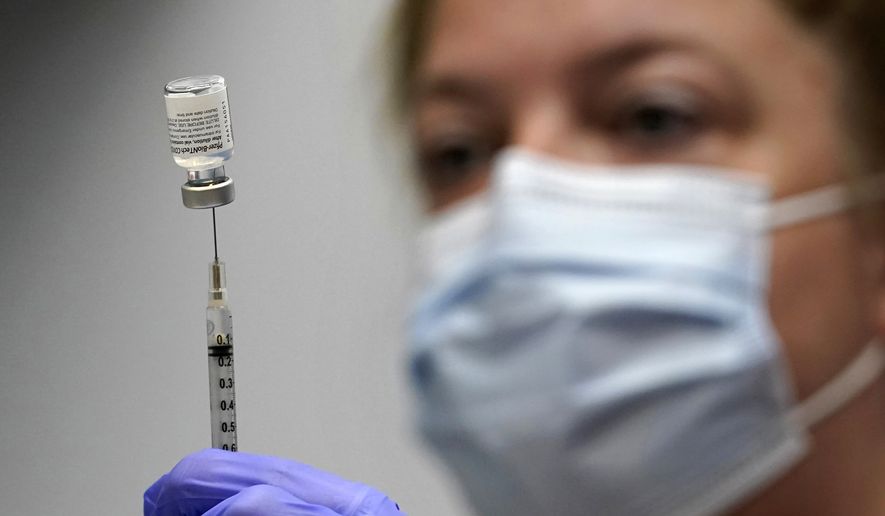An advisory panel for the Food and Drug Administration on Friday shot down Pfizer’s request to approve booster shots of its COVID-19 vaccine for the general population, citing a lack of safety data, but did approve the doses for seniors and high-risk groups.
The rejection is a blow to President Biden’s efforts to stop the spread of the coronavirus. His administration announced last month that booster shots for the general population would start by Sept. 20, sparking backlash from health experts and former FDA officials, who said that booster shots were not needed for ordinary Americans. Mr. Biden last week also announced plans to mandate vaccinations for 100 million workers in the U.S.
The 18-member FDA committee voted 16-2 that the safety and effectiveness data for the Pfizer-BioNTech vaccine do not support approving a third booster dose for Americans 16 and older six months after receiving the second shot of the two-dose vaccine.
Dr. Jeannette Lee, one of the advisers and a University of Arkansas medical sciences biostatistics professor, said broader safety data is needed for the booster shots. She noted she would support boosters for other high-risk groups, but that safety data is needed for other populations.
However, the committee voted unanimously to approve Pfizer’s booster shots under an emergency use authorization for individuals ages 65 and up and those at high risk for severe COVID-19. They would be given at least six months after the first two shots were administered. The committee members also agreed that health care workers and others at high risk of occupational exposure to the coronavirus should be included under the EUA.
Third doses for people who are immunocompromised have already been approved.
Dr. William Gruber, Pfizer’s senior vice president of vaccine clinical research and development, argued that there is a “clear erosion” of protection and that high levels of vaccine effectiveness must be maintained. Efficacy dropped from 96% two months after vaccination to about 84% up to six months later, he noted, adding that he anticipates that an extra vaccine dose would boost protection and reduce the spread of COVID-19.
Vaccine effectiveness wanes over time regardless of variants, he said. With the delta variant, Dr. Gruber said surveillance data shows waning protection between five and 10 months after the second shot of the Pfizer vaccine. If protection drops below 70% around five months, he said it would be expected to dip below 60% at 10 months. A third dose provides a “substantial boost” against the delta variant, similar to the original coronavirus strain, and had comparable reactions to the vaccine’s second dose.
Israeli experts told the committee they believe booster shots reduced the risk of COVID-19 for older populations more than 10-fold and helped curb a fourth pandemic wave. The country began administering boosters for its older residents in July.
Dr. Sharon Alroy-Preis, Israel’s head of public health services, said the boosters acted like a “fresh vaccine” and noted their study projects that if there was no booster or if the booster was administered later, hospitalizations could have “significantly exceeded national capacity.”
However, some scientists and vaccine experts have said that there is no evidence supporting that extra doses are needed for the general population. Evidence shows that COVID-19 vaccines still effectively protect against severe illness, hospitalization and death.
Dr. Eric Rubin, an FDA advisory panel member and professor of infectious diseases at Harvard Medical School, said not enough is known about the possible risks of boosters and that only a small number of people 60 years and older have received extra shots. But he noted there currently isn’t enough safety data, including on how boosters affect those under age 60.
The transmission of COVID-19 in the U.S. is largely driven by the unvaccinated, Dr. Rubin said, noting that extra shots for vaccinated Americans is unlikely to do much in reducing the spread of the virus.
Jonathan Sterne, a professor of medical statistics and epidemiology in the United Kingdom, said he had examined 76 studies on the vaccines’ effectiveness in the real world, and that various factors might have skewed the results, The New York Times reported. He warned that it’s hard for scientists to reach solid conclusions from studies of quick vaccine rollouts and that those making decisions about boosters should be wary of the short-term effects of an extra vaccine dose.
The FDA fully approved the Pfizer-BioNTech vaccine last month.
Federal regulators could review a third dose of the Moderna shot in the next few weeks. But it may take some time for Johnson & Johnson recipients to find out if they would need a second dose of the company’s one-shot vaccine.
The World Health Organization has called for postponing a rollout of boosters, noting that many countries are significantly lagging on vaccinations. The agency is striving to vaccinate 40% of the global population by the end of the year. However, some developed countries have already started administering boosters to their residents.
An advisory vaccine committee for the Centers for Disease Control and Prevention is scheduled to discuss boosters next week. The CDC has said it is considering boosters for older people, nursing home residents and front-line health care workers, rather than all adults, the Associated Press reported.
More than 41 million cases of COVID-19 in the U.S. have been reported, with about 145,000 new infections per day over a seven-day average, according to the CDC’s Dr. Sara Oliver. She said more than 660,000 Americans have died from COVID-19, with about 1,300 new deaths each day over a seven-day average.
• Shen Wu Tan can be reached at stan@washingtontimes.com.




Please read our comment policy before commenting.